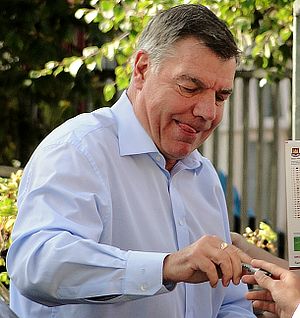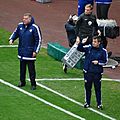Sam Allardyce facts for kids

Allardyce in 2014
|
|||
| Personal information | |||
|---|---|---|---|
| Full name | Samuel Allardyce | ||
| Date of birth | 19 October 1954 | ||
| Place of birth | Dudley, England | ||
| Height | 6 ft 3 in (1.91 m) | ||
| Position(s) | Defender | ||
| Youth career | |||
| 1968–1969 | Dudley Town | ||
| 1969–1971 | Bolton Wanderers | ||
| Senior career* | |||
| Years | Team | Apps | (Gls) |
| 1971–1980 | Bolton Wanderers | 184 | (21) |
| 1980–1981 | Sunderland | 25 | (2) |
| 1981–1983 | Millwall | 63 | (2) |
| 1983 | Tampa Bay Rowdies | 11 | (1) |
| 1983–1984 | Coventry City | 28 | (1) |
| 1984–1985 | Huddersfield Town | 37 | (0) |
| 1985–1986 | Bolton Wanderers | 14 | (0) |
| 1986–1989 | Preston North End | 90 | (2) |
| 1989–1991 | West Bromwich Albion | 1 | (0) |
| 1991–1992 | Limerick | 23 | (3) |
| 1992 | Preston North End | 3 | (0) |
| Total | 479 | (32) | |
| Managerial career | |||
| 1991–1992 | Limerick (player-manager) | ||
| 1992 | Preston North End (caretaker manager) | ||
| 1994–1996 | Blackpool | ||
| 1997–1999 | Notts County | ||
| 1999–2007 | Bolton Wanderers | ||
| 2007–2008 | Newcastle United | ||
| 2008–2010 | Blackburn Rovers | ||
| 2011–2015 | West Ham United | ||
| 2015–2016 | Sunderland | ||
| 2016 | England | ||
| 2016–2017 | Crystal Palace | ||
| 2017–2018 | Everton | ||
| 2020–2021 | West Bromwich Albion | ||
| 2023 | Leeds United | ||
| *Club domestic league appearances and goals | |||
Samuel Allardyce (born 19 October 1954) is a well-known English football manager and former professional player. He played in 578 league and cup games over a 21-year career. Most of his playing time was in the Football League in England. He also had short periods playing in the North American Soccer League and the League of Ireland.
Allardyce joined Bolton Wanderers in 1969. He spent nine years there, helping the club win the Second Division title in 1977–78. He then played for several other clubs in the 1980s. These included Sunderland, Millwall, and Preston North End. He helped Preston get promoted from the Fourth Division in 1986–87.
After his playing career, Allardyce became a manager. He first managed the Irish club Limerick in 1991. He led them to win the League of Ireland First Division title in 1991–92. He then managed several English clubs, including Blackpool and Notts County. He led Notts County to win the Third Division title in 1997–98. His most famous managing spell was at Bolton Wanderers. He led them to the Premier League in 2001 and helped them qualify for the UEFA Cup. He also managed other Premier League teams like Newcastle United, Blackburn Rovers, West Ham United, Sunderland, Crystal Palace, Everton, West Bromwich Albion, and Leeds United. He even had a short time as manager of the England national team in 2016.
Contents
Early Life and Football Dreams
Samuel Allardyce was born in October 1954 in Dudley, England. His father was a police sergeant. Both his parents were from Scotland. He has an older sister and an older brother. Allardyce went to Sycamore Green Primary School and Mons Hill School. He later found out he has dyslexia. As a child, he supported Wolverhampton Wanderers. He dreamed of playing for and managing that club one day.
Playing Career Highlights
Starting Out at Bolton
Allardyce started playing youth football at Dudley Town when he was 14. He quickly learned to play as a centre-half. He trained with bigger clubs like West Bromwich Albion. At 15, he was spotted by Bolton Wanderers and joined their youth team. Before starting his apprenticeship, he worked in a factory.
He signed his first professional contract on his 17th birthday. Bolton manager Jimmy Armfield gave Allardyce his first team debut in November 1973. He became a regular player under new manager Ian Greaves. He even won the club's Young Player of the Year award in 1975.
Bolton almost got promoted in 1976 and 1977. Allardyce was a strong defender. In 1977, a scout for the England team said he was one of the best central defenders in the league. Finally, in the 1977–78 season, Bolton won the Second Division title and were promoted to the First Division. Allardyce left Bolton in 1980 because he felt he was not paid enough.
Moving to Other Clubs
Allardyce joined Sunderland in July 1980. He became the club captain. However, he found it hard to travel from Sunderland to his home in Bolton. He asked to leave the club.
He then moved to Millwall, a team in the Third Division, in 1981. He was offered the chance to become manager there, but he felt he was too young at 28. He left Millwall in 1983.
Later Playing Years
In 1983, Allardyce played 11 games for the Tampa Bay Rowdies in the North American Soccer League. He learned a lot about modern training methods from American football.
He then joined Coventry City in the First Division. He was made captain. After a year, he moved to Huddersfield Town in 1984. He played alongside his old Bolton teammate, Paul Jones.
In 1985, he returned to Bolton Wanderers for a second time. However, the new manager did not play him much. He then joined Preston North End in 1986. Preston won promotion from the Fourth Division in 1986–87. Allardyce was even named in the PFA Team of the Year for that season. By this time, he started thinking about becoming a manager.
Managerial Career Journey
Early Management Roles
Allardyce started as a player-coach at West Bromwich Albion in 1989. He later became a full-time coach.
In 1991, he became player-manager of Limerick in Ireland. He led them to win the League of Ireland First Division title and get promoted.
He returned to England in 1992 to coach at Preston North End. He was briefly the caretaker manager.
Managing Blackpool and Notts County
In July 1994, Allardyce became manager of Blackpool. He signed players like Andy Morrison. Blackpool finished third in the league in 1995–96, just missing out on automatic promotion. They lost in the play-off semi-finals. Allardyce was dismissed shortly after.
In January 1997, he took over Notts County. They were struggling and were relegated that season. However, he led them to win the Third Division title in 1997–98. They won the title by a huge 19-point lead. He left Notts County in October 1999 to return to Bolton Wanderers.
Success at Bolton Wanderers
Allardyce became manager of Bolton Wanderers in October 1999. He inherited a talented team. In his first season, Bolton reached the play-offs and the semi-finals of both the League Cup and FA Cup.
In the 2000–01 season, Bolton won the play-off final against Preston North End. This meant they were promoted to the Premier League after three years away.
Staying in the Premier League
To stay in the Premier League, Allardyce signed international players like Bruno Ngotty and Youri Djorkaeff. Bolton had a great start to the 2001–02 season, even beating Manchester United. They managed to avoid relegation, finishing 16th.
For the 2002–03 season, he signed Nigeria captain Jay-Jay Okocha and Iván Campo. Bolton struggled again but avoided relegation on the last day.
In the 2003–04 season, Allardyce signed players like Stelios Giannakopoulos and Kevin Davies. His team finished eighth in the league and reached the League Cup final, where they lost to Middlesbrough.
European Adventures
Bolton continued to grow, signing experienced players like Gary Speed and Fernando Hierro. They finished sixth in the 2004–05 season. This earned them a spot in the UEFA Cup for the first time in the club's history.
In the 2005–06 UEFA Cup, Bolton reached the Round of 32. Allardyce was even considered for the England manager job after the 2006 World Cup. He signed Nicolas Anelka for a club record fee in 2006. Bolton had another strong season, finishing eighth. Allardyce left Bolton in April 2007.
Managing Newcastle and Blackburn
On 15 May 2007, Allardyce became manager of Newcastle United. He signed several new players, including Mark Viduka and Joey Barton. Newcastle had a good start but then had some poor results. Allardyce left Newcastle in January 2008.
In December 2008, Allardyce was appointed manager of Blackburn Rovers. He helped them move up the league table. Blackburn finished 15th in his first season. In the 2009–10 season, Blackburn reached the League Cup semi-final and finished tenth in the league. He was dismissed by Blackburn in December 2010.
West Ham United and Promotion
Allardyce became manager of West Ham United in June 2011, after they were relegated. He aimed to get them back to the Premier League. He signed many new players, including Kevin Nolan.
In May 2012, West Ham were promoted back to the Premier League. They beat Blackpool 2–1 in the play-off final. Allardyce called this his best achievement.
In the 2012–13 Premier League season, West Ham finished tenth. Allardyce signed a new two-year contract. He signed Andy Carroll and Stewart Downing in 2013. West Ham finished 13th in the 2013–14 season. Some fans were unhappy with the team's playing style. Allardyce left West Ham in May 2015.
Sunderland and England Roles
On 9 October 2015, Allardyce became manager of Sunderland. They were near the bottom of the Premier League. He signed new players in January 2016. Allardyce successfully led Sunderland to safety from relegation in May 2016. This also meant Newcastle United were relegated.
On 22 July 2016, Allardyce became manager of the England national team. He won his only game in charge against Slovakia. However, due to issues that came to light, Allardyce left the role by mutual agreement on 27 September 2016. He had managed the team for just 67 days.
Crystal Palace, Everton, and West Brom
In December 2016, Allardyce became manager of Crystal Palace. He helped them avoid relegation in the 2016–17 season. He then unexpectedly announced his departure in May 2017.
Despite saying he would not take another club job, Allardyce was appointed manager of Everton in November 2017. He guided Everton to an eight-place finish in the 2017–18 season. He left the club in May 2018.
On 16 December 2020, Allardyce became manager of West Bromwich Albion. They were struggling in the Premier League. Despite some good results, he was unable to keep West Brom in the Premier League. They were relegated in May 2021. This was the first time a team managed by Allardyce was relegated from the Premier League. He stepped down as manager at the end of the season.
Leeds United and Recent Role
On 3 May 2023, Allardyce was appointed manager of Leeds United. There were only four matches left in the 2022–23 season. Leeds were close to the relegation zone. Leeds lost three of their four games and were relegated to the Championship. On 2 June 2023, Allardyce left Leeds by mutual agreement. He had the shortest time as a Premier League manager, just 30 days.
Managerial Approach
Allardyce is known for using sports science and technology in his coaching. He uses computer analysis to help his teams. Former players say his preparation is a main strength, helping his teams be organized and strong in defence. His ability to manage players well is also praised.
He has a reputation for using "long ball" tactics, which means kicking the ball long distances up the field. However, he has said this idea is "totally and utterly wrong." He believes his teams play smart football. He is also known as a "survival specialist" because he often helps struggling Premier League clubs avoid relegation.
Personal Life
Sam Allardyce is married to Lynne Ward. They have a son, Craig, and a daughter, Rachael. He received an honorary doctorate from the University of Bolton in 2010. Besides football, Allardyce has run several businesses, including a pub and a restaurant. He published his autobiography, Big Sam, in 2015.
His grandson, also named Sam, signed for Oxford United in 2019. Allardyce has also managed the England teams at Soccer Aid several times, which is a charity football event. In November 2021, he took part in a charity match for a good cause, managing a team of Bolton Wanderers legends.
Honours and Achievements
As a Player
- Bolton Wanderers
- Football League Second Division: 1977–78
- Preston North End
- Football League Fourth Division promotion: 1986–87
- Individual
- PFA Team of the Year: 1986–87 Fourth Division
As a Manager
- Limerick
- League of Ireland First Division: 1991–92
- Notts County
- Football League Third Division: 1997–98
- Bolton Wanderers
- Football League First Division play-offs: 2001
- Football League Cup runner-up: 2003–04
- West Ham United
- Football League Championship play-offs: 2012
- Individual
- Premier League Manager of the Month: August 2001, November 2003, January 2004, December 2006, February 2014, October 2014
Managerial Statistics
| Team | From | To | Record | Ref. | ||||
|---|---|---|---|---|---|---|---|---|
| P | W | D | L | Win % | ||||
| Limerick (player-manager) | 1991 | 1992 | 27 | 14 | 10 | 3 | 51.9 | |
| Preston North End (caretaker) | 30 September 1992 | 30 November 1992 | 12 | 3 | 4 | 5 | 25.0 | |
| Blackpool | 19 July 1994 | 29 May 1996 | 102 | 44 | 23 | 35 | 43.1 | |
| Notts County | 16 January 1997 | 14 October 1999 | 145 | 56 | 39 | 50 | 38.6 | |
| Bolton Wanderers | 19 October 1999 | 29 April 2007 | 371 | 153 | 104 | 114 | 41.2 | |
| Newcastle United | 15 May 2007 | 9 January 2008 | 24 | 8 | 6 | 10 | 33.3 | |
| Blackburn Rovers | 17 December 2008 | 13 December 2010 | 90 | 32 | 24 | 34 | 35.6 | |
| West Ham United | 1 June 2011 | 24 May 2015 | 181 | 68 | 46 | 67 | 37.6 | |
| Sunderland | 9 October 2015 | 22 July 2016 | 31 | 9 | 9 | 13 | 29.0 | |
| England | 22 July 2016 | 27 September 2016 | 1 | 1 | 0 | 0 | 100.0 | |
| Crystal Palace | 23 December 2016 | 23 May 2017 | 24 | 9 | 3 | 12 | 37.5 | |
| Everton | 30 November 2017 | 16 May 2018 | 26 | 10 | 7 | 9 | 38.5 | |
| West Bromwich Albion | 16 December 2020 | 30 June 2021 | 26 | 4 | 8 | 14 | 15.4 | |
| Leeds United | 3 May 2023 | 2 June 2023 | 4 | 0 | 1 | 3 | 0.0 | |
| Total | 1,064 | 411 | 284 | 369 | 38.6 | — | ||
Images for kids
See also
 In Spanish: Sam Allardyce para niños
In Spanish: Sam Allardyce para niños
 | Selma Burke |
 | Pauline Powell Burns |
 | Frederick J. Brown |
 | Robert Blackburn |





